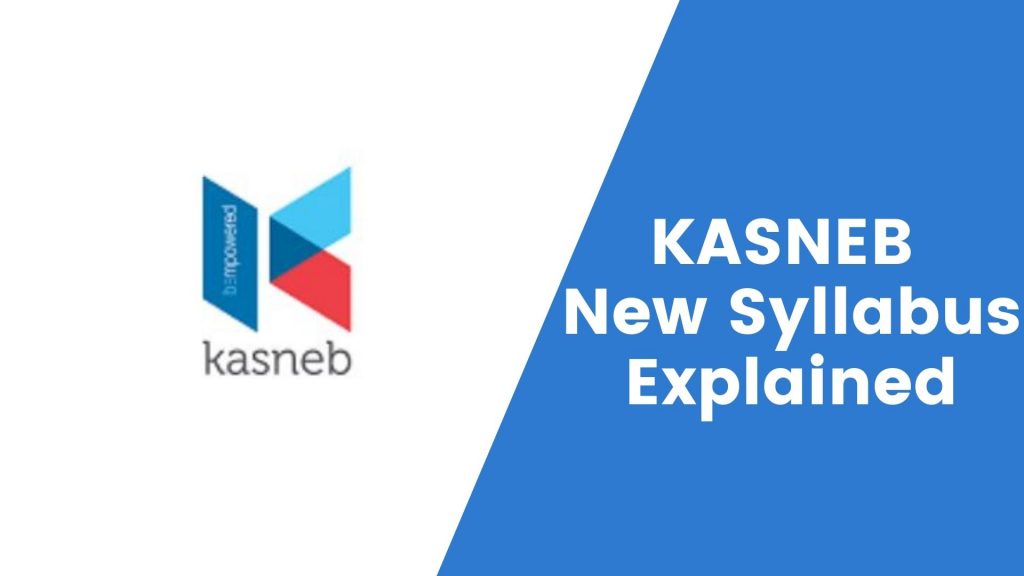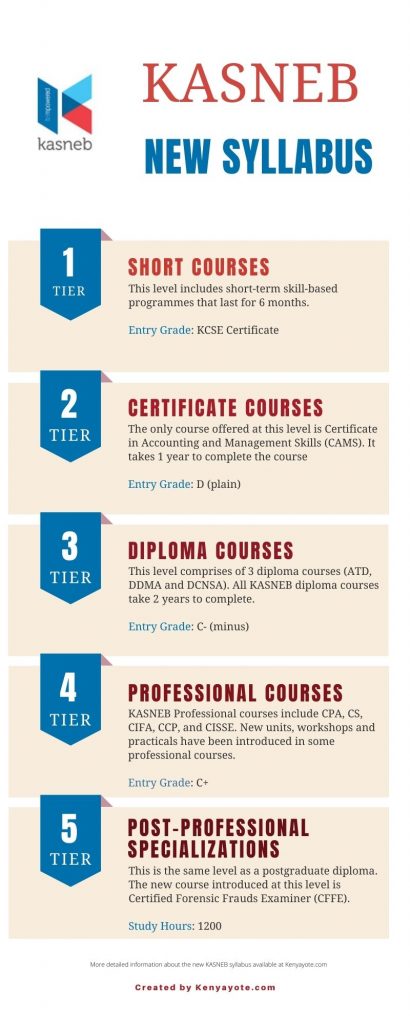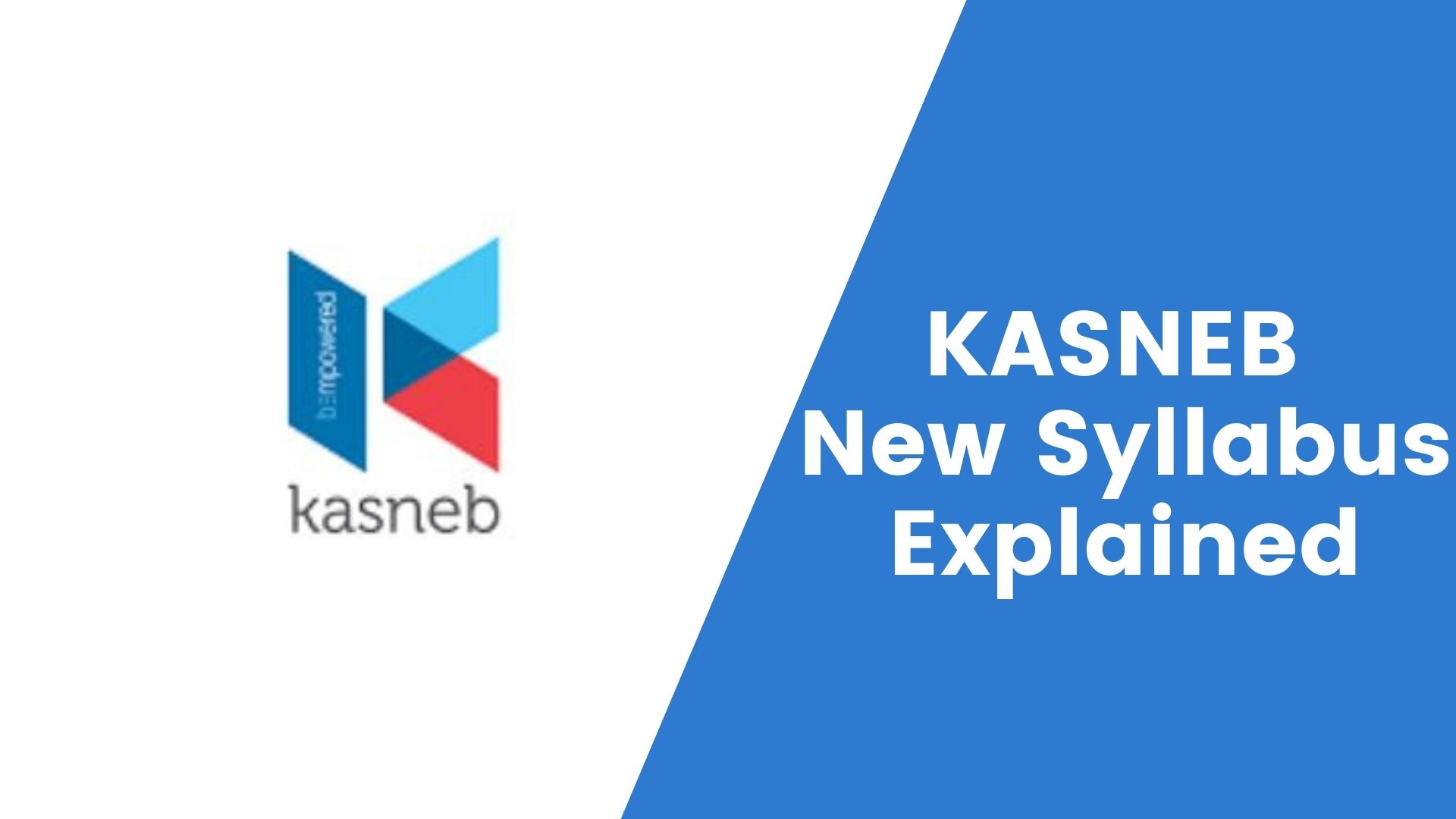KASNEB’s new syllabus was officially launched on 23rd July 2021. It is based on the competence framework. In some papers, students will be subjected to theory and practical papers, research projects, and workshops. The new syllabus comes with five-tier qualification levels as explained below.

New KASNEB Syllabus Levels of Qualification
The new KASNEB syllabus has five tiers of qualifications.
- Short Courses (Vocational Courses)
- Certificate Courses
- Diploma Courses
- Professional Courses
- Post-professional specializations
1. Short Courses (Vocational Courses)
This tier includes short-term skill-based programmes. Short courses include;
- Vocational Certificate in Entrepreneurship and Innovation
- Vocational Certificate in Graphic Design
- Vocational Certificate on Information and Cyber Security
- Vocational Certificate in Blockchain Technology
The courses target fresh high school graduates and professionals who want to gain knowledge and skills in the mentioned areas.
- Mode of study: Online
- Minimum entry requirements: KCSE Certificate
- First exam date: April 2022
- Study duration: 6 months
- Study Hours: 600 hours
- KNQF Level: 4
2. Certificate Course
The only certificate course offered by KASNEB is Certificate in Accounting and Management Skills (CAMS).
CAMS targets individuals who wish to gain knowledge in preparing basic accounts and financial statements for small enterprises or non-complex environments.
Duration: 1 year
Study Hours: 1200 hours
KNQF Level: 5
Entry Grade: D (plain)
3. Diploma Courses
This tier comprises of 3 diploma courses
Accounting Technicians Diploma (ATD): Meant for individuals who want to gain knowledge in preparing financial and management accounts and financial statements for small and medium-sized enterprises and compute basic taxes for businesses.
Diploma in Data Management and Analytics (DDMA): Meant of individuals who want to gain knowledge in non-complex design of databases, mine and analyze data for decision making.
Diploma in Computer Networks and Systems Administration (DCNSA): Meant for individuals who want to gain knowledge in managing non-complex networks
- Duration: 2 years
- Study Hours: 2400 hours
- KNQF Level: 6
- Entry Grade: C- (minus)
4. Professional Courses
KASNEB Professional courses in the new syllabus remain the same as they were with addition of units, practicals, and workshops in some courses.
Certified Public Accountants (CPA): Meant for individuals who want to be professional accountants, auditors, finance managers, tax managers, and consultants
Certified Secretaries (CS): Meant for individuals who want to be corporate secretaries, policy formulators and consultants in governance, auditors, and administrators
Certified Investment and Financial Analysts (CIFA): Meant for individuals who want to gain knowledge in investment, securities, and financial analysis, portfolio management, investment banking, fund management, etc.
Certified Credit Professionals (CCP): Meant for individuals who want to gain knowledge in credit management.
Certified Information Systems Solutions Expert (CISSE): Meant of individuals who want to gain knowledge in ICT (Information Communication Technology).
- Entry grade: C+
- KNQF Level: 7
- Study Hours:
NOTE 1: In addition to examinations, CPA candidates will attend workshops organized by KASNEB and ICPAK. After attending the Workshops, they will earn initial professional development (IPD) hours. Once students join ICPAK (as student members for free), IPD hours can be converted to Continuous Programs of Education (CPD) hours using a formula that will be announced by KASNEB.
NOTE 2: In CS a new paper has been introduced called boardroom management
5. Post-professional specializations
This is the same level as a postgraduate diploma. The new course introduced at this level is Certified Forensic Frauds Examiner (CFFE).
CFFE students will learn about reconstruction for lost data and records. This is specific to financial fraud and is guided by existing laws.
Some of the papers that will be offered in CFFE include;
- Introduction to Forensic Accounting and Audit
- Fraud and corruption schemes
- Overview of the legal and justice system
- Law related to fraud
- Principle of the law of evidence and the trial process
- Planning and conducting formal investigations
- Fraud prevention and detection
- Fraud risk management
- Integrated case study and workshop
Study Hours: 1200

Examination Exemption
To avoid repetition of courses, KANEB will exempt certain courses in degree or diploma that you have done that are similar in content to those offered by KASNEB.
UPDATE: Here is a detailed explanation of CPA new syllabus examination levels.

Leave a Comment